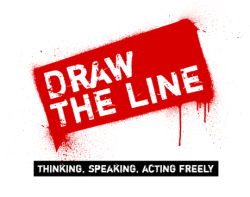#IndexDrawtheLine: Do laws restrict or protect free speech?
This month the Index Youth Advisory Board is discussing legal regimes and how they nurture or stifle the free expression of ideas. Examples of draconian laws abound: from Russia’s law banning “homosexual propaganda” to the UK’s use of RIPA legislation to violate the confidentiality of journalists’ sources.
When it comes to free speech: laws, what are they good for?
Legal frameworks protect speech and broader free expression. Take for instance Article 19 of the Universal Declaration of Human Rights which tells us that we all have the right to freedom of opinion and expression. Most of us, I’m sure, would cherish this right – who wouldn’t want to be able to express themselves freely and say what they like without the interference of the state?
In the United Kingdom, Article 10 of the Human Rights Act grants citizens freedom of expression. Most countries have different forms of Article 10. It is these laws – the ones that promote and protect our right to free speech – that form the crucial pillars of any democracy.
But do all laws protect our right to free speech?
Article 10 does a good job of granting us the confidence to speak out and ensure our voices are heard, but do other laws do the same? Or are there laws that, in some way, serve to restrict free speech? The example from Russia underline the use of legislation to restrict the right to expression. The law also curtails the right to assembly, another important part of a democratic society.
When you look into Article 10 itself, you begin to learn about the restrictions of the law and begin to understand how, in many ways, the state still does have authority over our freedom of expression. For example, Article 10 can be restricted “in the interests of national security” and in order to “maintain the authority of the judiciary”.
And what about the countries that don’t have specific laws that promote freedom of expression as strongly as the UK’s Article 10? Many may find it easy to conclude that countries like Iran have more laws that serve to restrict free speech, rather than protect it. It’s interesting to look at blasphemy laws in this instance to examine whether it protects the rights of those who are religious or restricts the rights of those who wish to criticise religion.
This month on Draw the Line, we discuss the impact a country’s laws have on our freedom of expression. Join the discussion and let us know whether laws serve to protect or restrict your right to free speech.
This article was posted on 16 Oct, 2014 at indexoncensorship.org

